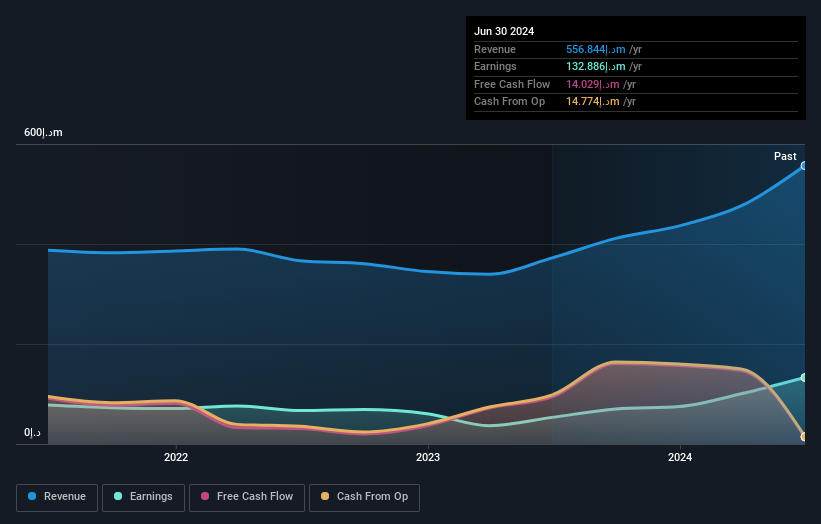- United Arab Emirates
- /
- Insurance
- /
- DFM:NGI
Public companies are National General Insurance Co. (P.J.S.C.)'s (DFM:NGI) biggest owners and were hit after market cap dropped د.إ81m

Key Insights
- National General Insurance (P.J.S.C.)'s significant public companies ownership suggests that the key decisions are influenced by shareholders from the larger public
- A total of 2 investors have a majority stake in the company with 66% ownership
- Insider ownership in National General Insurance (P.J.S.C.) is 11%
A look at the shareholders of National General Insurance Co. (P.J.S.C.) (DFM:NGI) can tell us which group is most powerful. We can see that public companies own the lion's share in the company with 48% ownership. Put another way, the group faces the maximum upside potential (or downside risk).
As a result, public companies as a group endured the highest losses last week after market cap fell by د.إ81m.
In the chart below, we zoom in on the different ownership groups of National General Insurance (P.J.S.C.).
View our latest analysis for National General Insurance (P.J.S.C.)

What Does The Institutional Ownership Tell Us About National General Insurance (P.J.S.C.)?
Institutions typically measure themselves against a benchmark when reporting to their own investors, so they often become more enthusiastic about a stock once it's included in a major index. We would expect most companies to have some institutions on the register, especially if they are growing.
National General Insurance (P.J.S.C.) already has institutions on the share registry. Indeed, they own a respectable stake in the company. This implies the analysts working for those institutions have looked at the stock and they like it. But just like anyone else, they could be wrong. If multiple institutions change their view on a stock at the same time, you could see the share price drop fast. It's therefore worth looking at National General Insurance (P.J.S.C.)'s earnings history below. Of course, the future is what really matters.

We note that hedge funds don't have a meaningful investment in National General Insurance (P.J.S.C.). Looking at our data, we can see that the largest shareholder is Dubai Investments PJSC with 48% of shares outstanding. Meanwhile, the second and third largest shareholders, hold 18% and 11%, of the shares outstanding, respectively.
To make our study more interesting, we found that the top 2 shareholders have a majority ownership in the company, meaning that they are powerful enough to influence the decisions of the company.
Researching institutional ownership is a good way to gauge and filter a stock's expected performance. The same can be achieved by studying analyst sentiments. As far as we can tell there isn't analyst coverage of the company, so it is probably flying under the radar.
Insider Ownership Of National General Insurance (P.J.S.C.)
The definition of company insiders can be subjective and does vary between jurisdictions. Our data reflects individual insiders, capturing board members at the very least. Company management run the business, but the CEO will answer to the board, even if he or she is a member of it.
Insider ownership is positive when it signals leadership are thinking like the true owners of the company. However, high insider ownership can also give immense power to a small group within the company. This can be negative in some circumstances.
Our information suggests that insiders maintain a significant holding in National General Insurance Co. (P.J.S.C.). It has a market capitalization of just د.إ727m, and insiders have د.إ80m worth of shares in their own names. This may suggest that the founders still own a lot of shares. You can click here to see if they have been buying or selling.
General Public Ownership
With a 23% ownership, the general public, mostly comprising of individual investors, have some degree of sway over National General Insurance (P.J.S.C.). While this size of ownership may not be enough to sway a policy decision in their favour, they can still make a collective impact on company policies.
Public Company Ownership
Public companies currently own 48% of National General Insurance (P.J.S.C.) stock. This may be a strategic interest and the two companies may have related business interests. It could be that they have de-merged. This holding is probably worth investigating further.
Next Steps:
While it is well worth considering the different groups that own a company, there are other factors that are even more important. Like risks, for instance. Every company has them, and we've spotted 3 warning signs for National General Insurance (P.J.S.C.) (of which 2 are concerning!) you should know about.
If you would prefer check out another company -- one with potentially superior financials -- then do not miss this free list of interesting companies, backed by strong financial data.
NB: Figures in this article are calculated using data from the last twelve months, which refer to the 12-month period ending on the last date of the month the financial statement is dated. This may not be consistent with full year annual report figures.
Valuation is complex, but we're here to simplify it.
Discover if National General Insurance (P.J.S.C.) might be undervalued or overvalued with our detailed analysis, featuring fair value estimates, potential risks, dividends, insider trades, and its financial condition.
Access Free AnalysisHave feedback on this article? Concerned about the content? Get in touch with us directly. Alternatively, email editorial-team (at) simplywallst.com.
This article by Simply Wall St is general in nature. We provide commentary based on historical data and analyst forecasts only using an unbiased methodology and our articles are not intended to be financial advice. It does not constitute a recommendation to buy or sell any stock, and does not take account of your objectives, or your financial situation. We aim to bring you long-term focused analysis driven by fundamental data. Note that our analysis may not factor in the latest price-sensitive company announcements or qualitative material. Simply Wall St has no position in any stocks mentioned.
About DFM:NGI
National General Insurance (P.J.S.C.)
Engages in underwriting various classes of life and general insurance, and reinsurance products in the United Arab Emirates.
Excellent balance sheet with proven track record.


